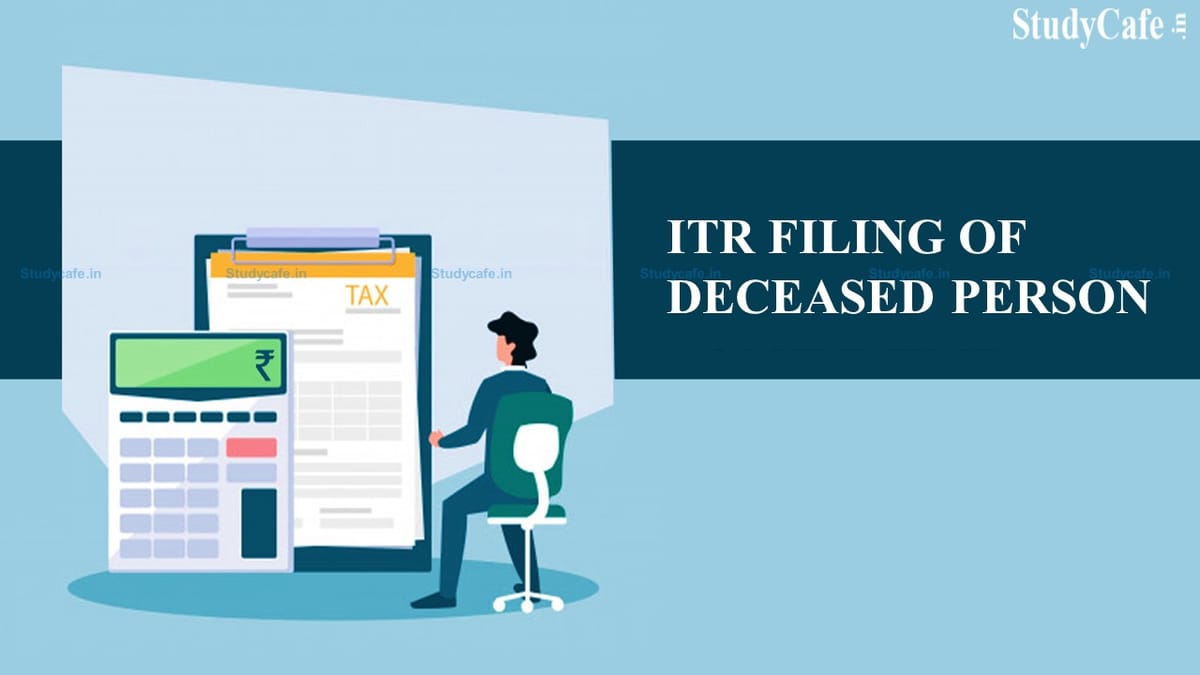How to file Income Tax Return (ITR) after Death of Taxpayer?
Deepshikha | Apr 15, 2022 |

How to file Income Tax Return (ITR) after Death of Taxpayer?
Even if a person dies during the year, if he or she made any income during that year, he or she must file income tax reports. Any individual who earns an income that is above the minimum amount that is exempt from the levy of income tax is required to pay income tax and file an income tax return under the Income Tax Act.
The solution to this issue is found in Section 159 of the Income Tax Act, which states that it is the legal successor of the deceased’s responsibility to submit income tax returns and pay any income tax due on his or her behalf.
For Income Tax, the legal heir would be considered the assessee, and all of the requirements of the Income Tax Act would apply to him in the same way as they would to the deceased assessee.
The legal heir must first register as the deceased’s legal heir on the IRS website, after which he or she can file the ITR on the deceased’s behalf.
The deceased’s income would include all earnings from the beginning of the year until his or her death. In the hands of the legal heirs, any income derived from assets inherited from the deceased is taxed.
For example, Mr A earned Rs. 80,000 per month as Interest from Fixed Deposit and he expired on 30th Nov. In such a case, the Income computed would be as follows:-
Income in the hands of the Deceased:
Rs. 80,000 x 8 months = Rs. 6,40,000
Income in the hands of the Legal heir (to be disclosed in personal Income Tax Return of Legal Heir):
Rs. 80,000 x 4 months = Rs. 3,20,000
The legal heir is responsible for filing the deceased’s income tax return and depositing the remaining income tax due (if any).
If a notice was sent to the deceased before his death, the notice’s actions against the legal heir can be maintained from the date of the deceased’s death. On behalf of the deceased, the legal heir is individually liable for all taxes. The deceased is responsible for any penalties, interest, or other amounts owed to the Internal Revenue Service.
The sum payable to the Income Tax Authorities on behalf of the deceased by the legal heir shall not, however, exceed the assets inherited by him. To put it another way, the legal heir is not liable for paying the fees out of his cash.
If an income tax refund is due, the refund will be processed following the Act’s normal requirements. It is always preferable to receive a refund in a joint account in which the deceased was a joint holder with any other person, as this allows the money to be used quickly.
If there is no joint holder, the account can be operated by the nominee named by the deceased. If there is no nominee, the account can be operated by the deceased person’s heirs.
All of the following documents must also be presented at the time of legal heir registration:
Any of the following papers can be submitted as proof of legal heirship to obtain a Legal Heir Certificate:
Affidavits for Legal Heir Registration were once accepted, however they are no longer accepted.
Following the submission of these documents, an application will be sent to the Income Tax Authorities, who will analyse the materials and accept or reject the application. An email is sent to the registered email address with the approval/rejection data.
In case of any Doubt regarding Membership you can mail us at [email protected]
Join Studycafe's WhatsApp Group or Telegram Channel for Latest Updates on Government Job, Sarkari Naukri, Private Jobs, Income Tax, GST, Companies Act, Judgements and CA, CS, ICWA, and MUCH MORE!"